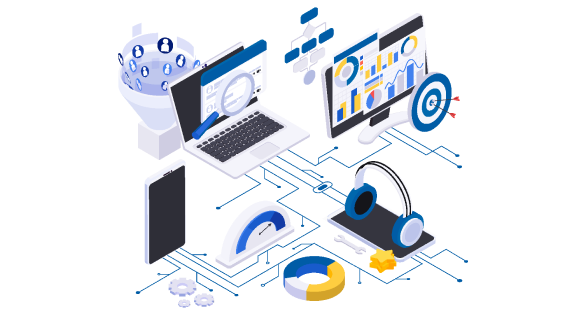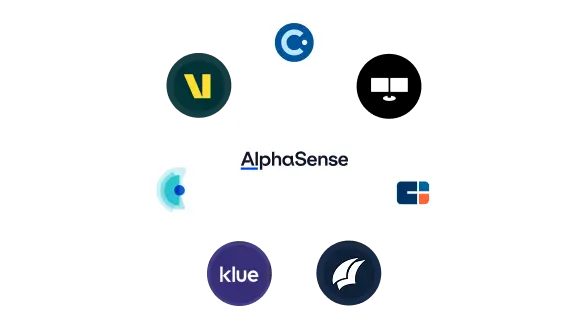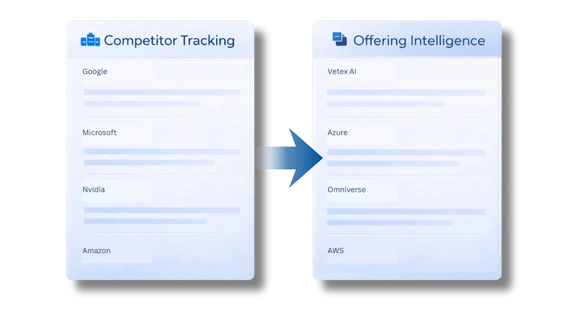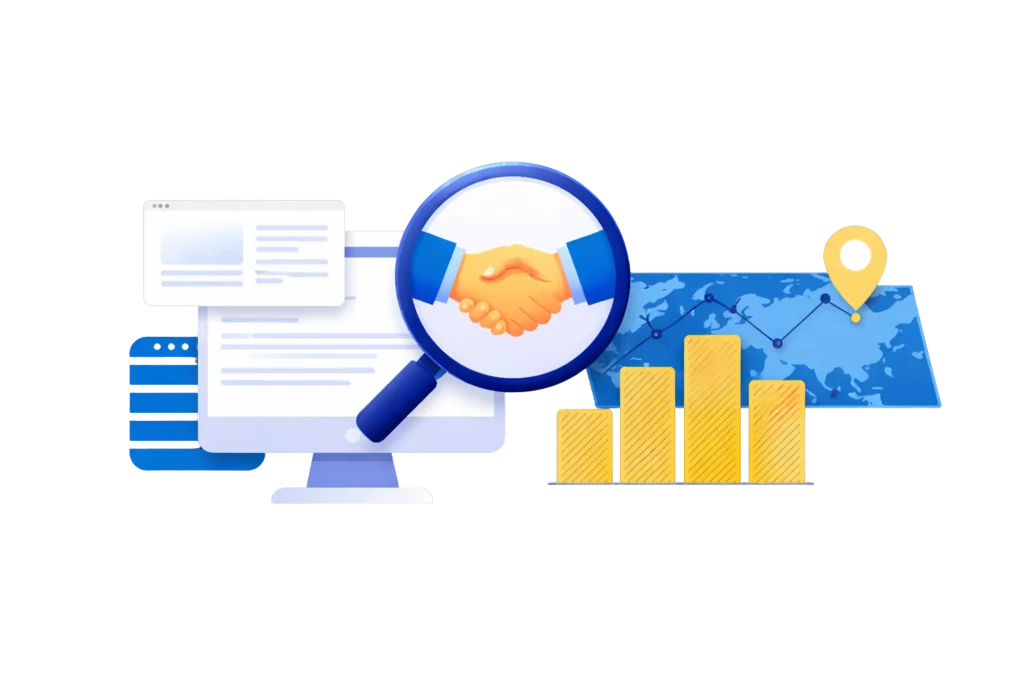2026 is shaping up to be a heyday for competitive intelligence pros. With organizations across industries investing in advanced competitive intelligence software, using the right competitive intelligence tools has become an essential business activity to sustain and grow in dynamic markets.
As Forbes puts it, successfully leveraging and implementing emerging technological solutions, like modern competitor intelligence tools and competitive research tools, is now critical for organizations aiming to maintain leadership and accelerate growth.However, fragmented and ad-hoc competitive intelligence processes are things of the past. A competitive intelligence platform that can fulfill the needs of modern-day businesses must automate collecting, analyzing, and distributing crucial information about your competitors. To help you make an informed choice and boost ROI, we explore 11 of the top competitive intelligence tools available today. Whether you’re a large enterprise, a scaling startup, or a fast-moving team looking for the best tools for competitive analysis, this guide has something for everyone—including insights on the best AI-powered competitive intelligence platforms, CI tools for business, and online competitive intelligence tools built for modern teams.
What are the essential features to consider in a Competitive Intelligence Tool?
You need a CI tool to meet your organization’s market and competitive intelligence objectives. To this end, (uncompromisingly) choose a CI tool that sports the following features:
- Data Sources & Custom Taxonomy
The best competitive intelligence tools should be able to collect data from diverse public sources and proprietary databases and leverage internal content using data from custom sources. It should have taxonomy capabilities for organizing unstructured information for easy storage, retrieval, and analysis. - Advanced Search Capabilities
The best competitive intelligence tools have advanced search capabilities to ensure quick and accurate results. The tool should offer natural language queries or use semantic search and artificial intelligence (AI) to better understand the searcher’s context and fetch relevant competitive insights. - User Experience
A CI tool’s multiple features can overwhelm users, limiting its utilization. The best competitive intelligence tools must simplify navigation and enhance tool usability across the organization. - Enterprise Software Integration
The best competitive intelligence tools integrate seamlessly with enterprise applications and databases, such as CRM, to improve workflow and productivity without affecting existing workflow. CI tools must enable users to access the tool easily and enhance engagement and collaboration. - Visualization
The tool should use advanced visualization tools to ensure insights are in easy-to-understand and visually appealing formats such as charts, graphs, and dashboards. - Distribution of Intelligence
An effective CI solution will allow you to share insights with internal stakeholders across the organization through communication and collaboration channels that your users use frequently.
Choosing the right solution from among the best market intelligence platforms, best online competitive intelligence tools, and top competitive intelligence companies depends on your organization’s scale, industry, and intelligence maturity.

11 Best Competitive Intelligence Tools to Use in 2026

Contify
Contify is a robust market and competitive intelligence platform designed to help businesses track and gather crucial information on competitors, customers, partners, and industry segments. Among the best competitive intelligence tools available today, Contify offers AI-powered automation, contextual analysis, and deep customization. It is able to deliver high-precision, actionable intelligence using an innovative approach to M&CI, which is based on ‘Key Intelligence Questions (KIQs)’ and ‘Derive Insights’ specific to those KIQs.
Contify is frequently rated among the top competitive intelligence platforms and best competitive analysis tools for its ability to deliver curated insights that cut through digital noise. It stands out as a scalable, intuitive competitive intelligence software for enterprises and startups alike.
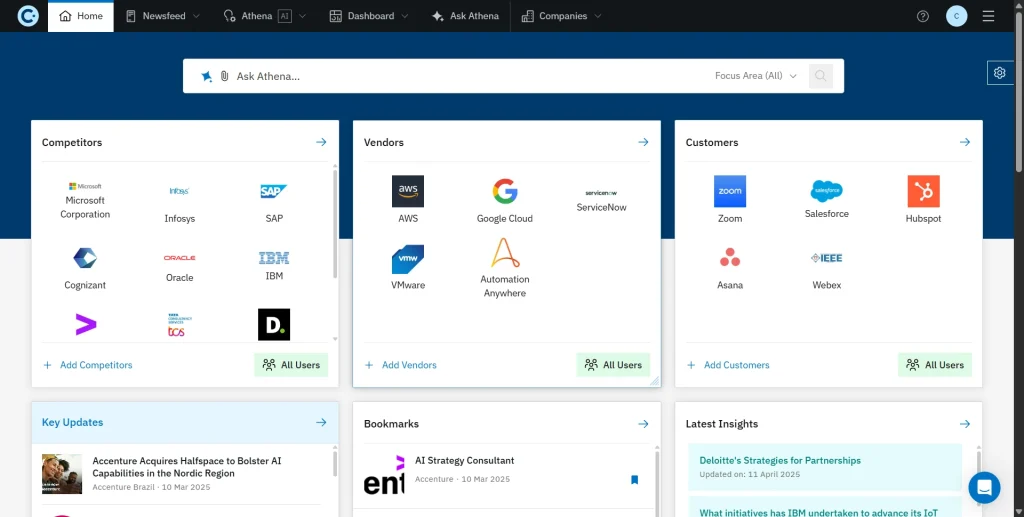
Key Features
- Global Newsfeed: Discover new competitors, technologies, trends, and business signals outside the scope of your current market and competitive landscape.
- Curated Newsfeed: Noise-free updates on your market and competitors from diverse sources like online news, company websites, social media, regulatory portals, and niche content provider, delivered via a fully customizable curated news feed.
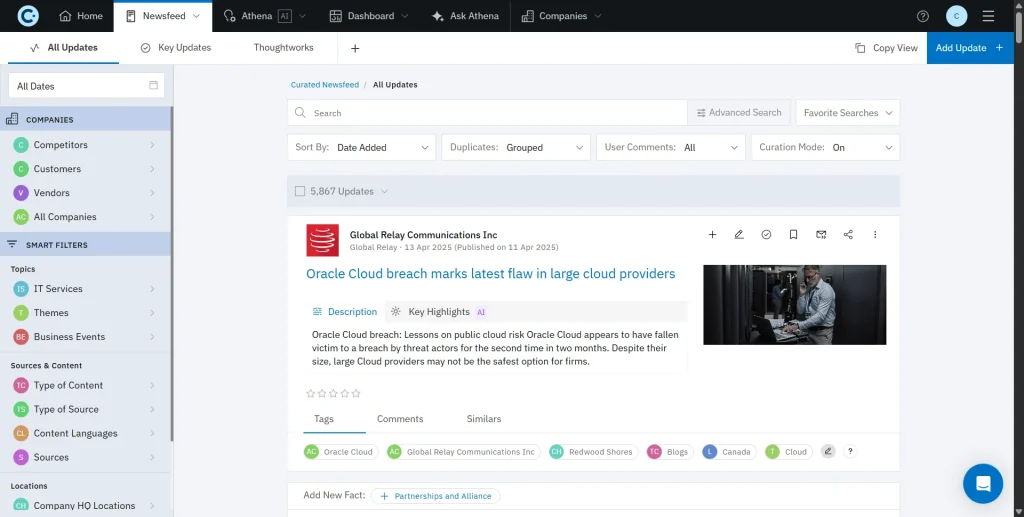
- Intuitive Dashboards: Renders your primary and secondary intelligence as compelling data visualizations to gain insights with dedicated dashboards for competitors, customers, partners, market segments, and topics of interest.
- Newsletter Manager: Streamline your newsletter creation and distribution process with customizable templates, content curation, analytics, and seamless integration, which is ideal for companies seeking CI tools for business that offer flexibility.
- Taxonomy Builder: Build your customized taxonomy of tags and filters to easily search for intelligence based on your competitors, customers, topics of interest, and more.
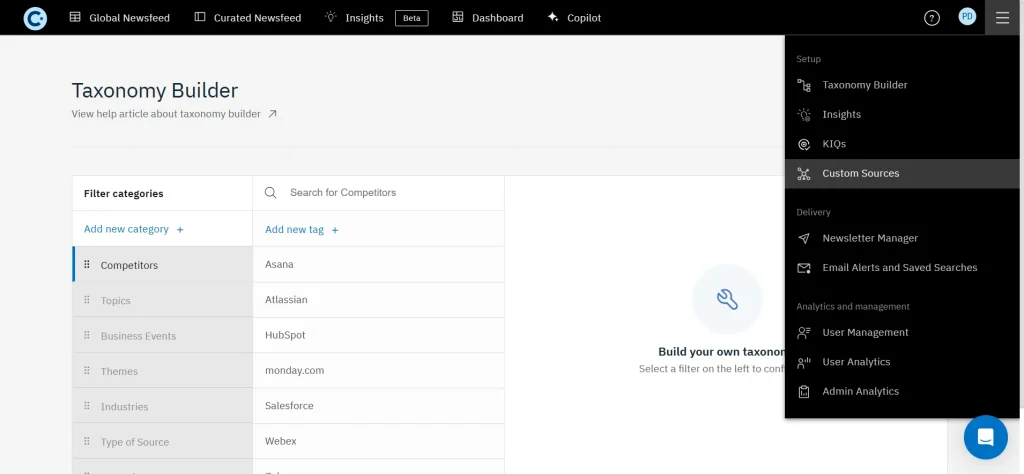
- Sourcing Manager: Add custom sources using the built-in sourcing module and manage all active sources in a single view.
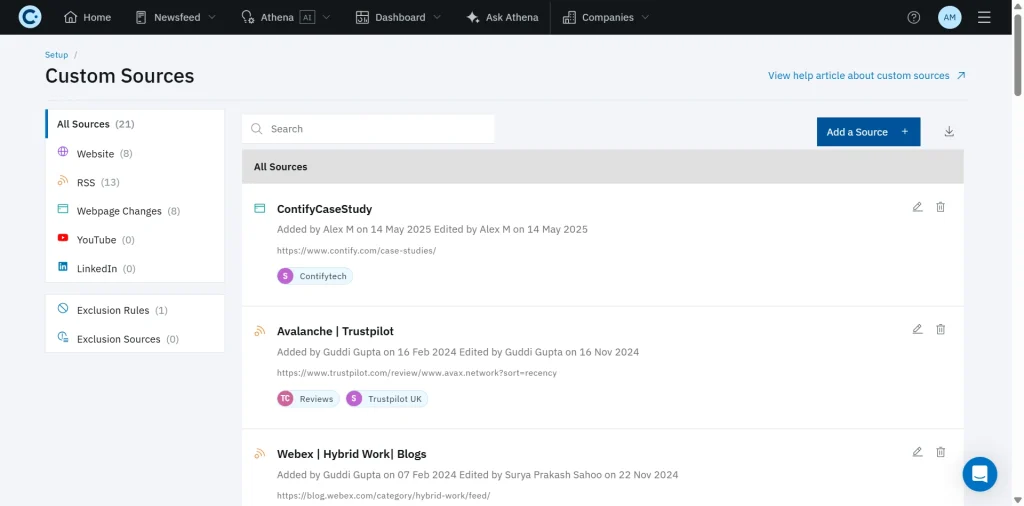
- SmartTranslate: Gain comprehensive intelligence coverage in over 100 languages with insights from regional publications and sources worldwide, ensuring truly global competitive intelligence coverage.
- User Management & Analytics: Ensure the right information is sourced, analyzed, and disseminated.
- Website Change Tracker: Track the website changes of your competitors or prospects to get early insights into their subtle tactical moves.
Pros
- Contify has an excellent support team that ensures timely query resolutions and engages with clients regularly.
- Flexible and scalable platforms serve diverse use cases across business functions and industry verticals.
- Taxonomy features help users filter information for different business areas, enhancing efficiency and decision-making.
- The centralized platform offers a one-stop shop for all industry news and consolidated competitive insights, saving time.
- The platform’s user-friendly interface and intuitive features make navigating and finding relevant information easy for users.
- Real-time monitoring across diverse sources keeps users updated on the latest competitor information.
- Contify provides competitive intelligence coverage by auto-translating content from over 100 languages.
Cons
- Does not offer an expert call library, unlike some competitive intelligence companies focused on qualitative insights.
- Not suitable for PR use cases such as brand monitoring. The core M&CI engine is designed to clean information by removing duplicates and similar information, which is essential for PR and Brand Monitoring.
- Some users have mentioned a long learning curve associated with the platforms when starting out as challenging.
Pricing
Contify offers customized pricing plans based on your use case, number of companies tracked, deliverables, user seats, and required features. Whether you’re a growing startup or a large enterprise, Contify stands out among the best AI-powered competitive intelligence platforms for flexibility and tailored deployment.
Contact the Contify team to learn more about pricing and explore how it compares in the competitive intelligence software comparison landscape.

SEMRush
SEMRush is an all-in-one digital marketing intelligence tool that provides businesses with comprehensive insights and competitive intelligence to optimize their online presence and stay ahead in the digital landscape.
It offers many features and tools that empower users to enhance their search engine optimization (SEO), advertising, content marketing, social media, and competitive research strategies.
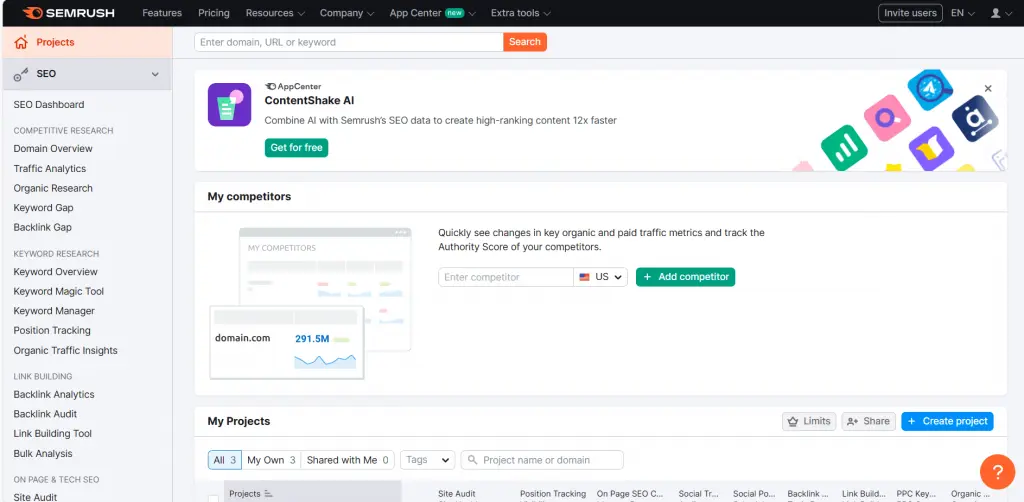
Key features
- Domain Analytics: Gain valuable insights into your competitors’ online strategies, including organic and paid search traffic, backlink profiles, top keywords, and advertising strategies.
- Keyword Research: Discover relevant keywords for your website and identify high-potential opportunities to optimize your content and improve search engine rankings. This feature makes SEMrush a valuable competitive intelligence solution for content teams.
- Competitive Analysis: Benchmark your website against competitors, uncover their digital marketing strategies, and gain insights into their strengths and weaknesses, ideal for those looking for competitive intelligence software that supports marketing functions.
- Backlink Analysis: Evaluate the quality and quantity of backlinks pointing to your website and monitor your link-building efforts to boost your search visibility.
- Advertising Research: Uncover competitors’ paid advertising strategies, including keywords, ad copies, and budgets, to refine your own advertising campaigns and maximize ROI.
- Content Marketing Toolkit: Analyze the performance of your content and identify opportunities to create engaging and relevant content that resonates with your target audience.
- Social Media Tracker: Monitor your social media presence, track competitors’ social media strategies, and measure the impact of your social media campaigns.
- On-Page SEO Checker: Optimize your web pages for better visibility in search engine results by analyzing key SEO factors, such as meta tags, content quality, and keyword usage.
Pros
- A comprehensive online competitor analysis tool offering detailed insights into competitors’ digital marketing activities.
- The platform provides precise organic traffic insights for competitor websites. The users found position-tracking features to be highly useful for monitoring keyword rankings.
- The in-depth site audits offer valuable insights for website optimization for better search engine performance and ranking, contributing to its popularity as one of the top competitive intelligence tools for marketers.
Cons
- Lacks expert call library.
- Data is sourced primarily from search engines, limiting the breadth of traditional market intelligence.
- It has reliability issues because of data inaccuracies, as highlighted by many users in the reviews.
- The platform is unaffordable for many businesses because of its siloed pricing model, in which costs rise as users subscribe to additional features.
Pricing
Semrush offers a variety of pricing plans to fit the needs of businesses of all sizes. Here is a summary of their pricing plans:
- Pro: $129.95/month. This plan includes access to all of Semrush’s core features, such as keyword research, backlink analysis, and competitive analysis.
- Guru: $249.95/month. This plan includes all of the features of the Pro plan, plus additional features such as content marketing research, social media management, and advertising research.
- Business: $499.95/month. This plan includes all of the features of the Guru plan, plus additional features such as enterprise-level support and custom reports.
While SEMrush may not offer the same breadth as some AI-powered competitive intelligence platforms, it remains one of the best competitive intelligence tools for digital teams focused on web visibility, content performance, and ad strategy.

Similarweb
Similarweb is a versatile competitive intelligence tool that equips businesses with deep insights into their digital performance, user behavior, and market dynamics. It provides a comprehensive visibility into web traffic, audience trends, and competitor activity, making it a powerful asset for data-driven decision-making.
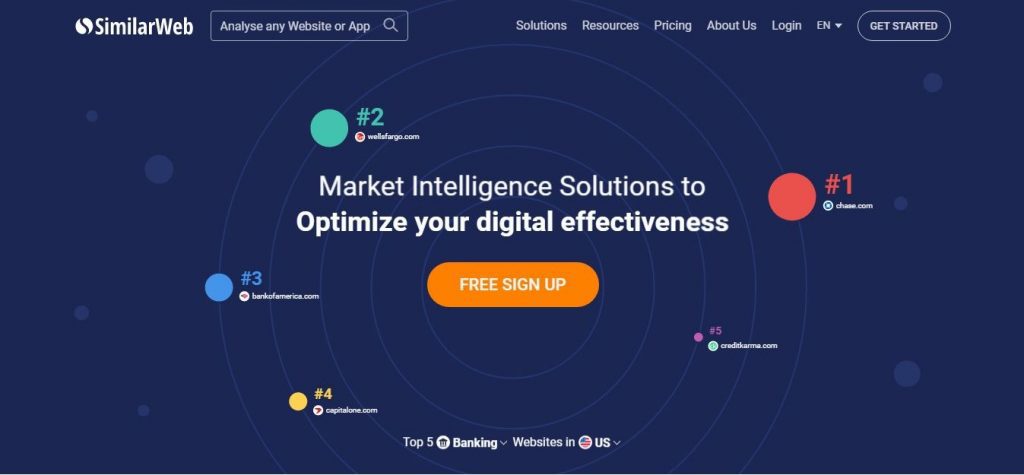
Whether you’re in marketing, product strategy, or growth, Similarweb is a strong contender among the best competitive intelligence tools for startups and enterprises alike.
Key features
- Website Analysis: Gain comprehensive insights into website traffic, including total visits, engagement metrics, traffic sources, and audience demographics. Analyze loading times, mobile optimization, and technical SEO aspects to assess user experience.
- Audience Analysis: Understand your audience better by examining their interests, demographics, online behavior, and engagement across various channels. Identify potential customer segments, track audience growth, and refine your targeting strategies.
- Competitive Intelligence: Benchmark your website’s performance against competitors, analyze their traffic sources, top referring websites, and keywords. The tool also provides insights into their online strategies, including advertising campaigns, partnerships, and content marketing efforts, making it a standout among comprehensive competitive intelligence solutions.
- Industry Analysis: Explore trends and market dynamics in your industry to identify opportunities and adapt your strategies accordingly. Discover top players, emerging websites, and industry benchmarks.
- Keyword Research: Identify relevant keywords for your SEO and content strategies. Understand search volume, keyword trends, and competitors’ keyword rankings. Optimize your content to improve organic search visibility.
- App Analysis: Analyze app performance metrics, user reviews, and downloads. Understand app visibility, user retention, and engagement to optimize your mobile app strategy.
Pros
- The competitive analysis tool enables businesses to compare their website with up to five competitors simultaneously, providing valuable insights into the online competitive landscape
- It provides comprehensive competitive insights across SEO (search engine optimization), content, ad campaigns, web traffic sources and more
- Competitor data and analytical insights are more accurate and superior than similar tools
- The company has a knowledgeable customer service support team with superior teaching and communication skills
Cons
- Primarily sources data from search engines, which can limit broader applicability for some users, compared to more holistic market intelligence platforms
- The lack of a comprehensive database leads to inaccurate competitive insights in some geographical regions
- Many users have found the platform to be expensive compared to the value it provides
Pricing
SimilarWeb offers a variety of pricing plans to fit the needs of businesses of all sizes. Here is a summary of their pricing plans:
- Starter: $125/month. This plan includes access to basic features, such as website traffic, mobile apps, and social media data.
- Pro: $433/month. It includes access to all of the features of the Starter plan, plus additional features, such as competitive intelligence, market research, and advertising intelligence.
- Enterprise: Custom pricing. It includes all of the features of the Pro plan plus additional features, such as custom reports, a dedicated account manager, and white labeling.
Whether you’re evaluating the best competitive intelligence software or exploring top competitive intelligence companies, Similarweb is a compelling choice for digital-first brands seeking granular online performance insights.

Watchmycompetitor
Watchmycompetitor(WMC) combines automated tracking and human analysis to deliver relevant and actionable insights. Positioned as a hybrid competitive intelligence solution, WMC helps businesses stay ahead of industry shifts and competitor movements through curated intelligence feeds.
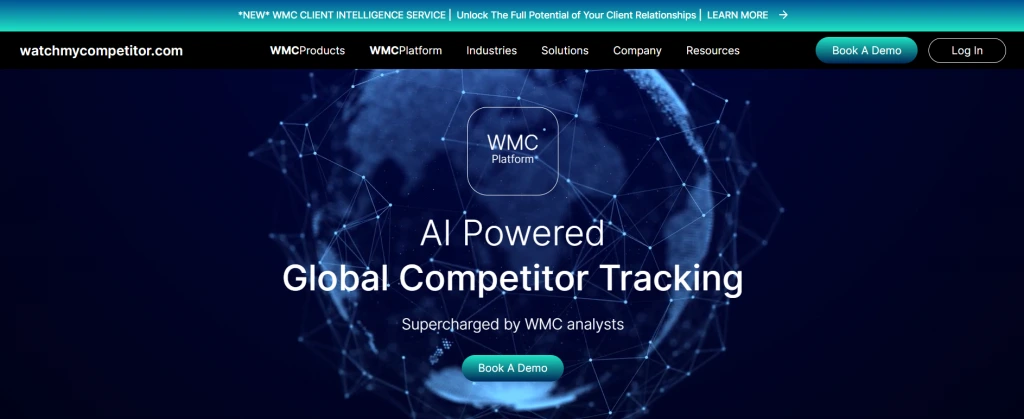
Key Features
- Automated Tracking: It ensures valuable data across all digital media is monitored, captured, and stored, and you don’t miss any updates. All data is centralized in an analytics dashboard, offering businesses a complete view of their competitive landscape.
- Timeline Function: The functions encapsulate competitors’ activities in an easy-to-understand format throughout different timeframes, making WMC a highly strategic CI tool for business planning.
- Enterprise Integration: The WMC platform integrates with CRMs, data visualization tools, messaging, and collaboration applications, enabling you to share intelligence with your team easily.
- Customized Reporting: The reports can be customized to meet the needs of different teams and departments in an organization. It enables you to derive maximum value from data captured by the WMC platform.
- Alerts: You can set the dashboard alerts to receive important competitor intelligence in real-time or any specific time duration. You can use email summaries to send notifications about the competitor’s latest activities.
Pros
- The platform lets users get a consolidated view of their organization’s and competitors’ social media postings in a single dashboard.
- The weekly curated newsletter covering industry and competitors’ information in an easy-to-read way is of great value to its clients.
- The customer support team is highly competent and goes the extra mile from onboarding to ongoing support.
Cons
- The cost increases as the number of competitors being tracked increases. It is a challenge for companies to identify the right set of competitors to track within their budget, especially startups seeking affordable competitive intelligence software.
- Sometimes, the tagging on the platform is incorrect, leading to inaccurate insights.
- The customized alerts generate irrelevant alerts and need to be tweaked periodically.
- The customization of tools for specific business use cases is challenging.
Pricing
The platform has not provided any pricing details and offers customized pricing plans depending on the organization’s requirements.

Google Alerts
Google Alerts is a free and simple-to-use online monitoring tool. It allows users to receive email notifications whenever new content relevant to their search queries appears online. With Google Alerts, businesses can stay updated on topics of interest, monitor their brand reputation, track industry trends, and keep an eye on their competitors.
Users can also set up alerts for their competitors’ brand names or industry-related keywords to keep track of their activities and stay informed about industry trends, product launches, or marketing campaigns. This helps businesses gather competitive intelligence and identify potential opportunities or threats.
Though Google Alerts is not a full-fledged competitive intelligence platform, it is widely used for basic monitoring needs and serves as an entry-level competitive research tool for individuals and small teams.
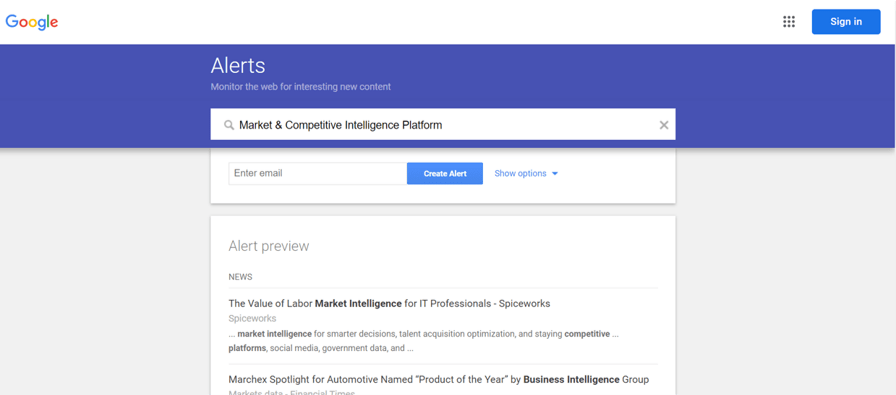
Key Features
- Search Query Monitoring: Users can set up specific search queries or keywords relevant to their business, industry, or interests. Google Alerts will continuously scan the web for new content that matches the specified queries, including news articles, blogs, websites, and more.
- Comprehensive Coverage: Google Alerts scours many online sources, including news websites, blogs, forums, etc. It ensures broad coverage and allows users to receive notifications about relevant content from various online channels.
- Real-time Notifications: Whenever new content matching the specified search queries is detected, Google Alerts sends email notifications directly to the user’s inbox. This enables users to promptly access the latest information without actively searching for it.
- Customization Options: Google Alerts offers customization features, allowing users to control the frequency of alerts (e.g., daily or weekly), the sources to include or exclude, and the regions or languages for which they want to receive alerts. It is however, much less granular than paid competitive intelligence software.
- User-Friendly Interface: Setting up and managing alerts is straightforward, requiring only a Google account. Users can easily modify or delete alerts, ensuring they receive the most relevant and up-to-date information.
Pros
- Simple to set up and operate, making it one of the most accessible online competitive intelligence tools for new users.
- It allows users to set up the frequency of alerts and notifications. It helps them to set alerts based on the importance of the subject.
- The tool is free of cost.
Cons
- Google Alerts can sometimes be overwhelming, with hundreds of alerts making email management challenging for users.
- Does not track social media, internal databases, or niche content sources, limiting its effectiveness as a full competitive intelligence solution.
- Sometimes, the tool sends unrelated information, or the authenticity of the information is questionable.
- The tool is not flexible as it lacks extensive customization features to enable organizations to meet their unique requirements.
Pricing
Google Alerts is a free service from Google. However, its simplicity comes at the cost of depth and customization. For startups or solopreneurs, it can serve as one of the best competitive intelligence tools for startups looking for basic tracking. But businesses seeking richer insights, real-time dashboards, and integrated reporting should consider advanced CI tools for business or full-featured competitive intelligence platforms.

AlphaSense
AlphaSense is a market and competitive intelligence platform used by financial services companies, consultancies, and many S&P 100 companies. The platform’s diverse sources include public and proprietary content data such as company SEC filings, event transcripts, expert calls, news, regulatory content, trade journals, and equity research.
The AI-enabled platform delivers market and competitive insights to professionals, helping them to make decisions with accuracy and speed.
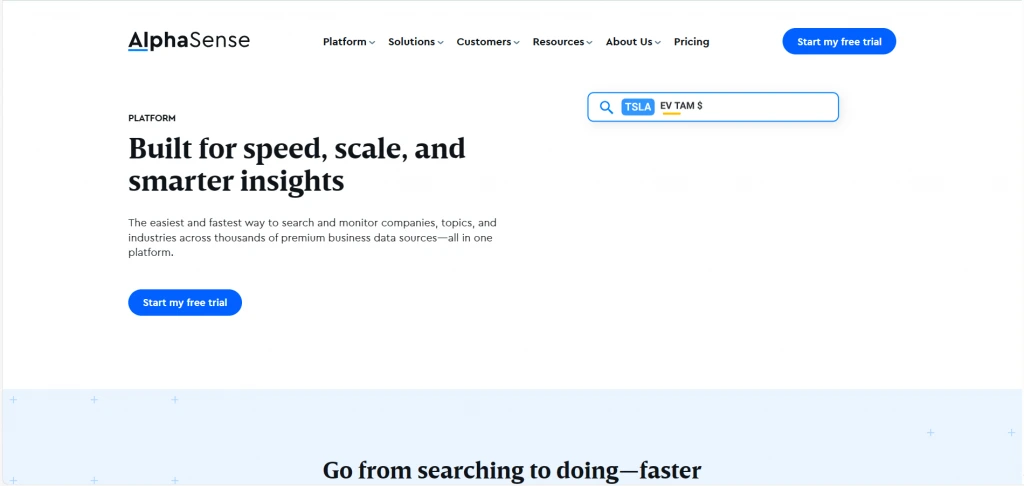
Key Features
- Data Sourcing: Users can upload their data and reports, making it indexable for internal users and stakeholders on the AlphaSense platform. The platform also has exclusive real-time and aftermarket research collections from global brokers and regional and boutique firms, which makes it ideal for deep competitive research.
- Expert Transcript Library: The platform includes expert call transcripts and interviews of industry experts, customers, competitors, and former executives, providing deeper insight into markets and competitors.
- User Management: The administrator can provide users segmented access to tools based on role. The administrator can easily add and remove users with the platform using Active Directory/SAML-based identity providers to onboard and offboard team members.
- Data Compliances: The platform provides features enabling you to comply with domestic and international data collection and privacy laws, making it a secure market intelligence software option.
- Enterprise Intelligence: AI-powered enterprise intelligence features enable secure searches and summaries across your proprietary internal content and vast repository of 300M+ premium content, improving organization efficiency.
- Predictive Recommendation: It provides a weekly personalized list of the most relevant documents based on the companies, industries, and topics you follow.
Pros
- Through the acquisition of Stream by Mosaic, acquired a proprietary expert calls library. The library includes interviews with former executives, competitors, and supply chain members of top companies.
- The platform search function is highly valued by its users. It enables them to perform detailed searches of proprietary & online resources for particular phrases or keywords.
- Customizable email alerts enable users to monitor the most important themes, companies, and market updates in real-time, daily, or weekly.
- AlphaSense’s iOS App lets users stay updated on critical topics in real time and listen to earning calls and expert interviews.
Cons
- The high number of features overwhelms the users, making navigation challenging.
- The lack of newsletters and few integrations to collaboration or CRM tools limits the insights to a narrow band of users.
- Limited collaborative features and licensing terms make knowledge sharing a challenge.
- The cost is prohibitive, and scaling can be expensive since the company considers each function or department a separate entity.
- Visualization tools are limited to financial data.
Pricing
There is no publicly available information on AlphaSense pricing. The subscription prices are customized based on organization requirements and vary for small- and medium-sized companies and large enterprises. The companies can selectively choose the features and are charged accordingly, though the solution is generally positioned as a premium competitive intelligence tool.

SpyFU
Spyfu is a digital marketing intelligence tool offering competitive intelligence capabilities focused on SEO, content, digital advertising, social media analytics, and other digital marketing insights. Spyfu insights enables businesses to create more effective competitive online marketing strategies that boost visibility, sales, customer service, and engagement. It is especially helpful for organizations looking to compete with digital-native players and traditional rivals in the online space.
Key Features
- SEO Auditing and Monitoring: It delivers instantaneous notifications to users to alert them about the SEO changes that can impact website performance.
- SEO Content Strategy: The tool recommends related keywords for a given search term that help you create a content strategy and drive your web page optimization efforts.
- Domain Authority Improvement: It helps you to identify relevant link building opportunities for improving domain authority and page ranking.
- PPC Competitor Research: Allows users to examine competitors’ paid keywords and Google Ads campaigns for deeper competitive PPC analysis.
- Benchmarking Reports: The provides search ads benchmarking reports to help you improve your business paid marketing performance.
- Real-Time Alerts: It provides real-time alerts and sends notifications to you and other stakeholders through email, text, or in-app to keep everyone informed.
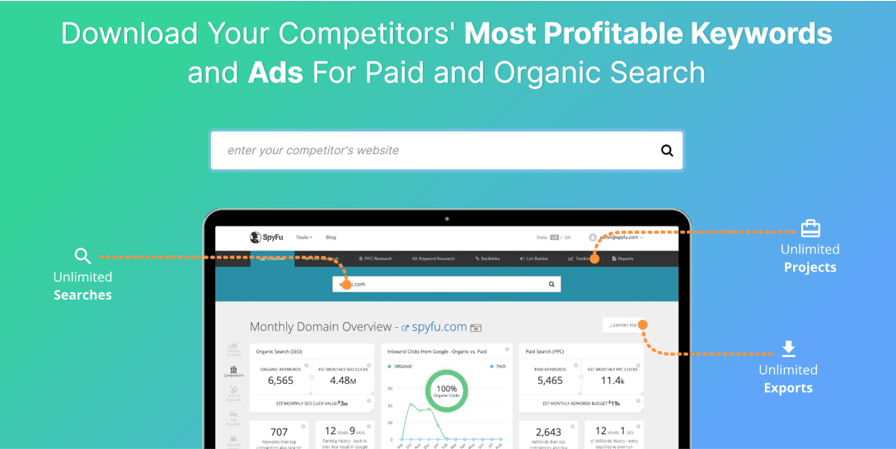
Pros
- The platform analyzes competitors’ advertising strategies and tactics precisely, giving valuable insights into competitors’ marketing and sales plans.
- The keywords insight feature enables users to identify top-performing keywords and compare them against their competitors’ keywords, which helps create an SEO and CEO strategy, supporting stronger SEO competitive analysis.
- It has dedicated tools for competitive backlink analysis and built-in features to facilitate social outreach for backlinks acquisition.
Cons
- It is a web analytic tool lacking broad CI capabilities, limiting its utility for competitive analysis and insights.
- Lacks advanced AI search features requiring users to spend more time in search to get the required content.
- SpyFu graphs are not intuitive or user-friendly, and users have found them challenging to navigate to derive meaningful conclusions.
Pricing
SpyFU offers the following pricing plans

Crayon
Crayon’s competitive intelligence platform offers B2B enterprises strategic insights focusing specifically on sales and marketing functions, enabling them to win and retain customers. It serves B2B companies across technology, retail, and finance
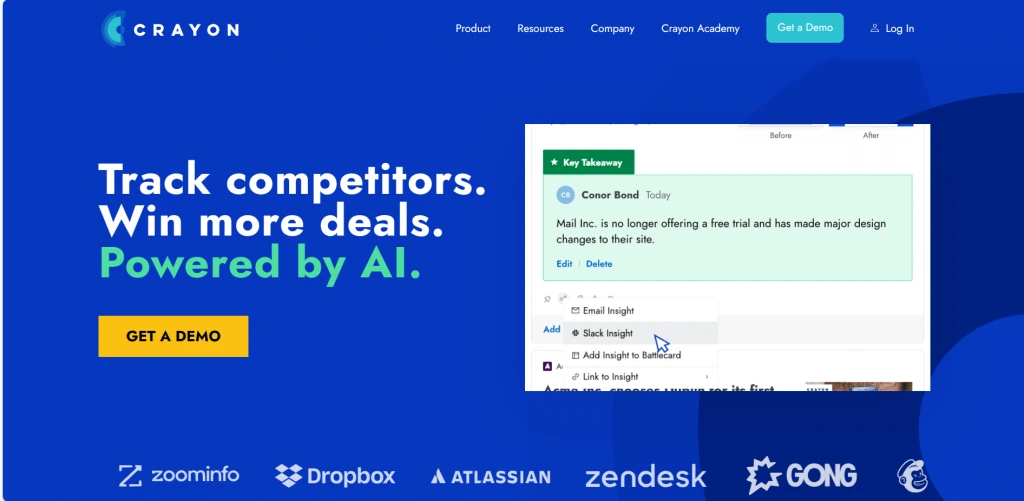
Key features
- Custom Data Collection: The platform collects information from various data sources, including both online and offline. It enables you to make custom data collection queries.
- Website Change Tracker: Advanced web page monitoring capabilities help you keep track of changes in your competitor’s platform features, plans, pricing, promotions, etc.
- User Management: The platform enables you to provide role-based access, allowing different teams to access the most relevant competitive intelligence insights for their functions.
- Enterprise Integration: Seamlessly integrates with CRMs, communication, and collaboration platforms to streamline competitive analysis and cross-functional intelligence distribution.
- Customizable Dashboards: It enables you to create a customizable dashboard to curate relevant competitive data.
- Partner Ecosystem: The company also has built an extensive external partner network that provides clients access to analytics firms at a reduced rate.
Pros
- The platform’s two-way integrations with CRM, sales content, conversational intelligence, and collaboration tools automate insights and deliverable distribution.
- The platform enables sales teams to create and maintain centralized battle cards that are easy to update and deliver through the sales enablement platform.
- The ability to customize and share links with the front-end sales team facilitates sharing relevant updated competitor information.
Cons
- The pricing model based on pay-per-competitor makes it expensive as the cost increases with the increase in competitors.
- The platform lacks advanced AI and search capabilities, which poses challenges to users who must continually filter search results to narrow down content.
- The platform has limitations in scalability in comparison to other tools.
Pricing
Crayon has not displayed its pricing plans on its website. Still, customer reviews from multiple sites indicate it follows the pay-per-use model, charging companies on the number of competitors they track. The HubSpot listing of Crayon indicates the starting price to be $15,000 per year.

Wide Narrow
The Wide Narrow platform is a market and competitive intelligence platform launched in 2018 and was acquired by data aggregator InfoDesk. The merger helps the platform to expand data sourcing and innovation capabilities. It offers comprehensive intelligence solutions for broad strategic and functional use cases. The platform’s future roadmap includes increasing the automation of analyses and building industry-specific ML models.
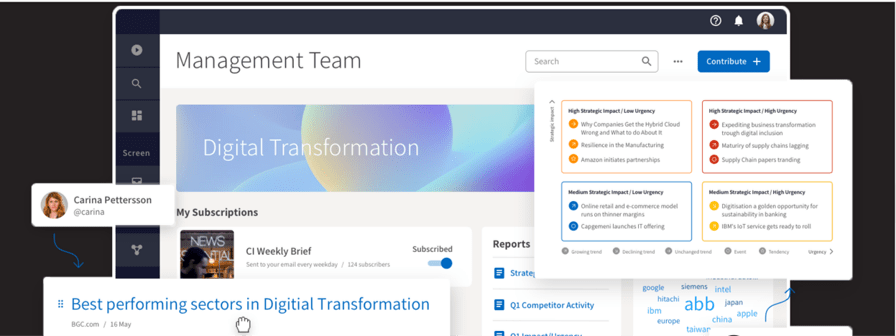
Key Features
- Data sourcing: Centralizes all information sources, allowing users to aggregate, filter, tag, and manage competitive and market data in one place. The company information services team offers support to clients for locating information.
- Use cases: The user-friendly, intuitive AI platform can be leveraged across multiple use cases of strategy, innovation, sustainability, and supply chain.
- Enterprise Integrations: The platform supports integrations with over 370 third-party applications and platforms such as Teams, Slack, Salesforce, and more. The integrations combined with multitudes of templates enable stakeholders to access information in the tool and format of their choice.
- Templates: It includes standard templates for strategy work such as landscapes, SWOT analyses, and trends and product-focused work such as competitive battlecards and product comparisons.
- Data visualization: The platform includes widgets for charts, graphs, and other features, making it easy for users to create and distribute interactive intelligence deliverables like newsletters, reports, and benchmarks.
Pros
- The customers appreciate the innovative approach to AI and the updates to the user interface and platform.
- The flexible reporting engine enables users to quickly build and easily share engaging deliverables such as dashboards, newsletters, reports, benchmarks, and battle cards.
- Customized alerts and notifications about competitors keep users informed about real-time market trends and competitive environment.
Cons
- Web page tracking requires an additional account with Visualping.
- The platform must be populated with substantial data, requiring the organization more time than similar tools to realize its full potential.
- Lacks expert call transcripts.
Pricing
Wide Narrow has not publicly displayed its pricing on the website. The platform follows a subscription-based pricing model that varies based on the organization’s size and the features it subscribes to.

Valona Intelligence
Valona’s (previously M-Brain) competitive intelligence platform combines Artificial Intelligence (AI) with expert human analysis to deliver actionable insights to businesses across industry verticals. The platform offers full-service competitive intelligence coverage, offering a broad, in-depth insight into the organization’s relevant markets and industries locally and internationally.
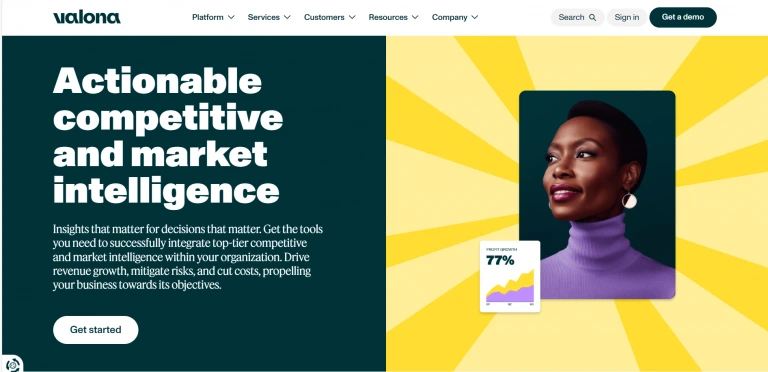
Key Features
- Field Intelligence Integration: The platform facilitates the capture of field intelligence data and seamlessly assimilates it into profiles, offering you a complete view of the market and up-to-date competitor data for optimal decision-making.
- Tagging: The platform tagging feature helps you efficiently categorize customer groups, products, countries, and more, enhancing data retrieval, filtering, and analysis to improve operational efficiency.
- Data Visualization: Advanced data visualization tools present insights visually as graphs and charts, which help you quickly spot trends and patterns and aid in strategic decision-making, leading to better business choices.
- Benchmarking: The benchmarking tool provides comprehensive comparative evaluations of your products, delivering critical insights for market positioning.
- News Summaries: Uses AI-powered news summarization from global sources, with information curated from global sources. These summaries are translated into more than 70 languages for your diverse stakeholders spread across the globe.
Pros
- The platform offers full-service competitive intelligence coverage supporting multiple business functions within the organization.
- It leverages generative AI to produce business summaries.
- The platform integration with enterprise applications supports data sharing and collaboration in the organization.
Cons
- It lacks an expert call library.
- Even with AI and machine learning, the search functionality lacks sophistication.
- There is a steep learning curve for new users who take longer to learn the platform’s intricacies.
Pricing
Valona Intelligence offers custom pricing based on your organization’s size, use cases, and required features. Pricing is structured to support flexibility in deployment across small, mid-sized, and large enterprises seeking tailored market intelligence software solutions.

Kompyte
The marketing and competitive intelligence platform targets product marketing, sales enablement, and the broader sales team to provide them with battle cards and other sales tools to increase win rates. The narrow focus limits its adoption across the organization.
The platform automates competitor updates across multiple sources in real-time. It tracks various competitors simultaneously, enabling businesses to benchmark their organization and identify improvement areas.
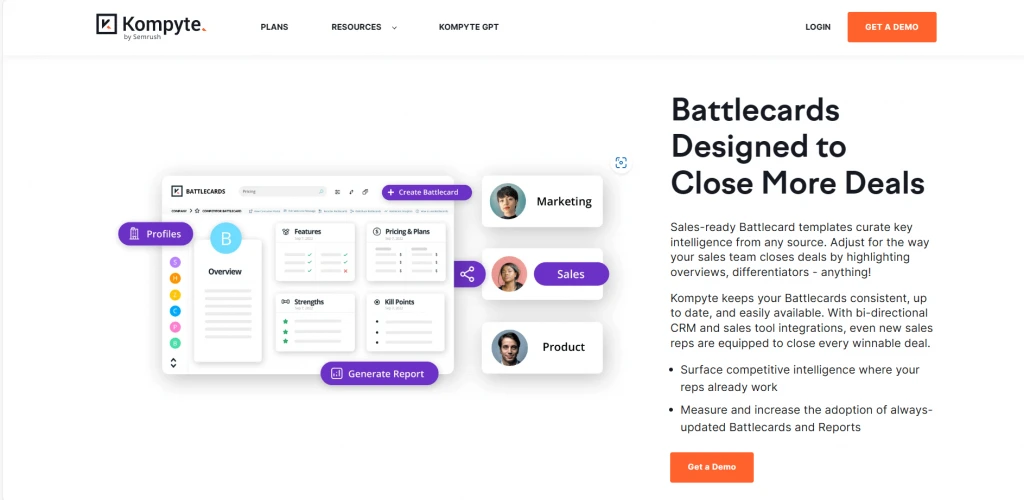
Key Features
- Battlecards Templates: It offers sales-ready battlecard templates that curate intelligence from any source and can be modified to suit sales team requirements by highlighting overviews, differentiators, etc. The platform keeps battle cards consistent and updated, which can be easily accessed by your sales rep due to bi-directional CRM and sales tool integrations.
- Win/loss analysis tools: The tools power the organization’s CI program with real data such as revenue, competitor frequency, and win rates. The automated win/loss calculations enable you to assess the direct impact of your competitive initiatives on revenue. The collaboration with research partner IcebergIQ makes Kompyte the single source of truth for all win/loss and churn/renewal insights.
- AI Daily Summaries: AI-generated summaries enable you to quickly glance at competitor information and insights, saving time and effort.
Pros
- The platform automatically updates battle cards and win/loss reports.
- Sales battle cards dynamically flow to CRM applications Salesforce or HubSpot, enabling just-in-time access to sales reps.
- It monitors competitors’ activities in real-time and provides instant updates.
Cons
- Lacks expert call transcripts.
- There are no topic summaries to distinguish a long list of content; users must search multiple times to filter the content.
- The platform’s focus on product and sales functions limits its utility for other departments and units.
Pricing
Kompyte offers the following three pricing plans.

Conclusion
The best competitive intelligence tools mentioned in this blog offer a range of features and capabilities to empower businesses in gathering competitor insights for making informed strategic decisions.
The best competitive intelligence tools enable organizations to leverage primary and secondary intelligence from multiple sources to identify opportunities, mitigate threats, and refine their business strategies.
As market dynamics shift and new competitors enter the space, it becomes crucial to remain proactive. Leveraging these tools alongside modern competitive intelligence techniques ensures you can continuously track, analyze, and respond to competitor activity in real time.
By deeply understanding your competitors’ strategies, strengths, and weaknesses, you can position your business for success and drive sustainable growth in the ever-evolving business landscape.
Download a free competitive analysis template today
Note: The information in this blog is based on secondary research, relying heavily on customer reviews and information on the company website. Please conduct thorough research and choose the tools that best align with your business requirements and goals.
Frequently Asked Questions
What features should I look for in a competitive intelligence tool?
Key features to look for include real-time tracking, customizable taxonomy, advanced search, intuitive user experience, CRM integration, insight distribution, visual dashboards, and support for both internal and external data sources.
How does a CI platform help in business decision-making?
A CI platform enables data-driven decision-making by providing timely, relevant insights into competitors, customers, market shifts, and emerging trends, helping teams refine strategy, identify risks, and uncover growth opportunities.
Can I integrate CI tools with CRM and enterprise systems?
Yes, most leading competitive intelligence tools integrate with CRMs like Salesforce and HubSpot, as well as enterprise collaboration tools like Slack, Teams, and SharePoint, to streamline workflows and boost adoption across teams.

